Recommendations and practical advice for funders and nonprofits

Nonprofits had to adjust during COVID-19 in the way they deliver services, communicate with their stakeholders and their own teams.
We wanted to find out more about their digital transformation, including the challenges and opportunities that emerged during these turbulent times.
In the first blog, we highlighted the key learnings in nonprofits’ digital delivery and the impact of COVID-19, while in the second blog, we looked at their challenges and opportunities and how they are working to understand their needs to inform future planning. In the third blog, we focused on how nonprofits embrace new technologies and how they can assess the available options based on their needs and resources.
In this fourth blog, we want to collate the key insights from this project and share recommendations and practical guidance. More specifically, we are looking at the takeaways that funders, nonprofits, intermediaries in the charity sector can apply from this project to better support nonprofits with their digital transition to build a resilient nonprofit sector.
Key lessons for nonprofits
We found that 85% of organisations reported that only up to 25% of their services were digital before the pandemic, and that despite the additional challenges posed by the pandemic, 86% of participating nonprofits have ‘largely’ or ‘completely’ moved their face-to-face services to digital.
However, plans for digital improvements need to be designed with every stakeholder in mind. Most organisations reported agreement that internal staff, delivery partners and volunteers were comfortable with existing technologies, but there were lower levels of understanding among service users indicating the need to increase confidence amongst these stakeholders and communicate changes most effectively.
And it’s not just about the service users. It’s also important to invest in translating new functionality into teams’ abilities to adopt new tools. For example, while more organisations were confident in their digital prioritisation and leadership planning, fewer were confident with their teams’ ability to adopt new tools and methods.
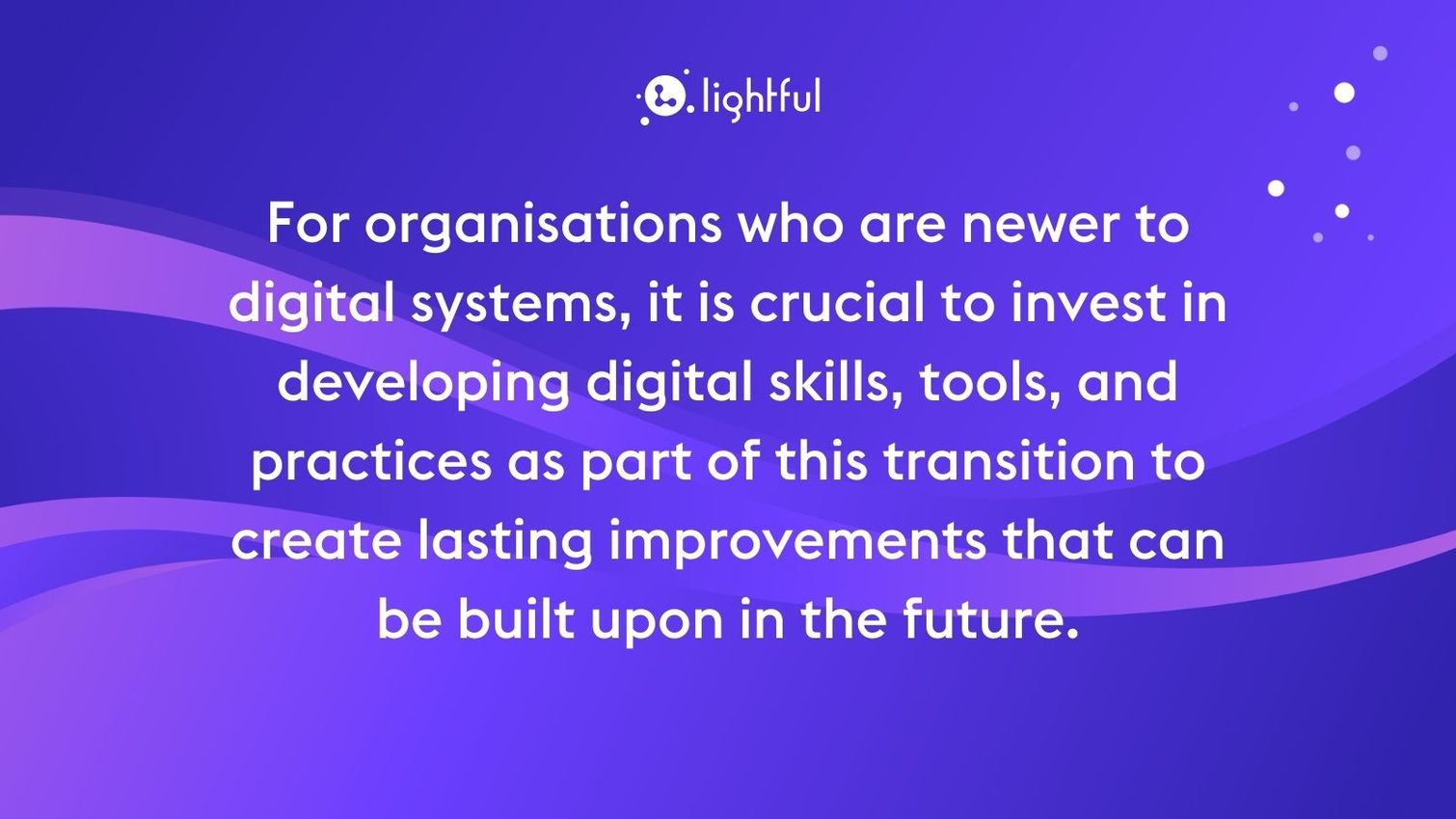
For organisations who are newer to digital systems, it is crucial to invest in developing digital skills, tools, and practices as part of this transition to create lasting improvements that can be built upon in the future. This blog series looked at various potential digital initiatives identified by organisations, from new websites to improvements in digital fundraising.
However, across all of these different digital projects we believe that the following standard steps can set up projects for success and mitigate risks associated with complexity, user adoption and stakeholder buy-in:
- Understand your users’ needs: Invest the time and resources to develop a holistic understanding of user journeys to establish the key challenges and pain points.
- Prioritise: Prioritise your digital needs and get the stakeholders involved in the decision-making process whilst taking account of project dependencies.
- Assess possible technology solutions: Explore available options and dedicate the time to understand how technology can best address the identified challenges, whether through your organisation’s existing technology, or if additional external solutions are required.
- Create an iterative roadmap: It’s crucial to set up an iterative roadmap that will work based on your needs and provide flexibility to overcome your challenges. You need the skills, confidence, and resources that will help you be more resilient both in the short and long term.
- Invest in building your team’s skills and confidence: You need to allocate your resources across each of the above stages to ensure your team feels able to contribute to and make the most out of digital evolution processes. Combine staff training and upskilling with dedicating resources to engage team members throughout the improvement process, enabling them to use technology effectively.
Key lessons for funders
Several organisations reported having little to no digital delivery before COVID-19.
However, we’ve also seen from the survey responses that those with more established digital capabilities had clear advantages in responding to COVID-19. It’s therefore important for funders to understand both the challenges their grantees are facing and also how they can support them throughout their digital journey.
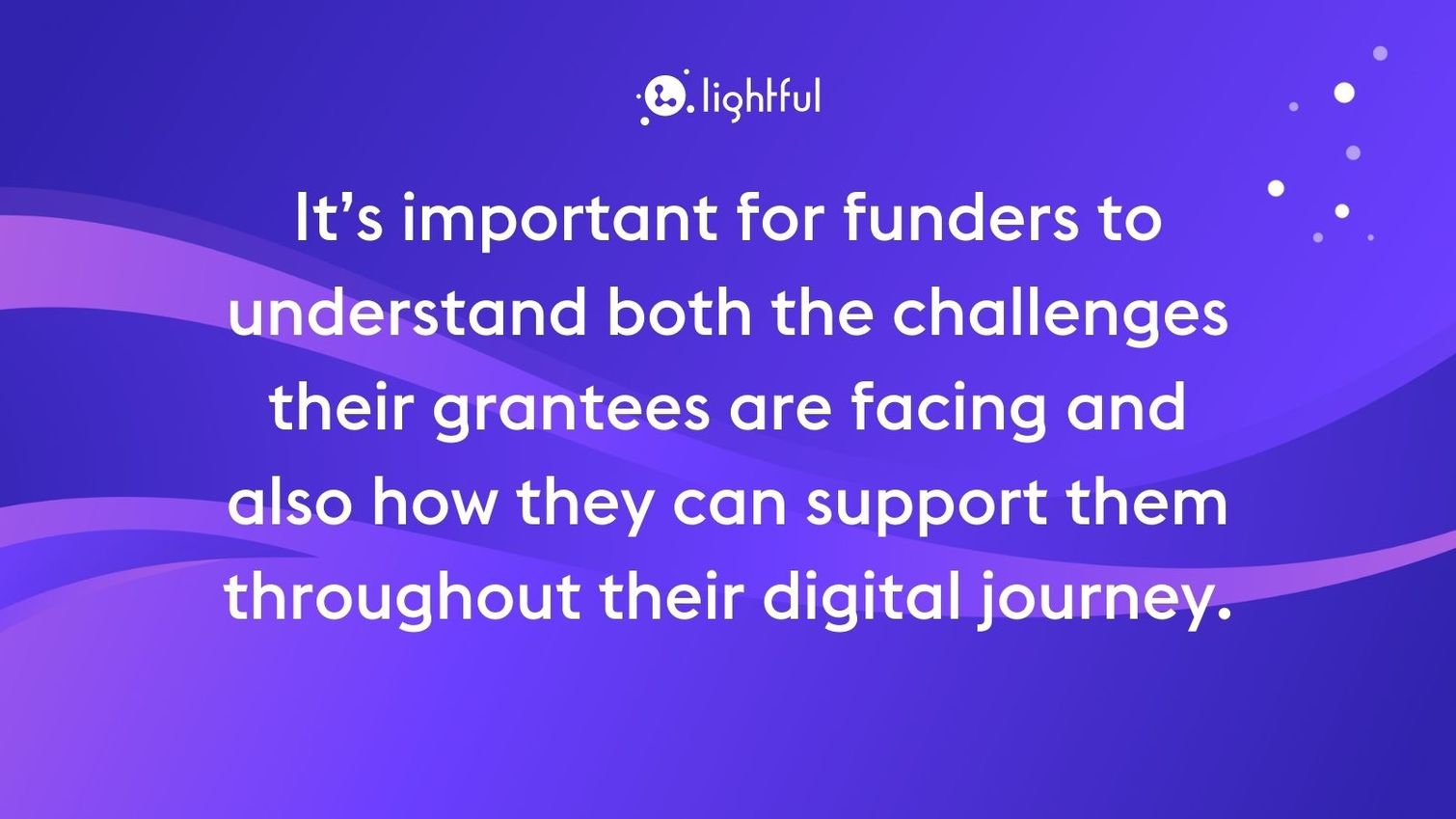
Here are some practical ways for funders to help nonprofits be more agile and resilient:
- Understand how your grantees use technology: Start by understanding how nonprofits want to use technology and what’s currently holding them back. Getting to grips with an organisation’s in-depth capabilities allows you to explore different ways to support them in their digital journey. It’s also important for funders to recognise that potential grantees may be hesitant to share their digital or other development needs if they think it will hurt their funding chances, so funders need to think about how they promote an open dialogue around this.
- Provide access to learning opportunities: It’s not just the lack of up-to-date technology and systems that holds back nonprofits. Sometimes it’s the inability to implement a plan simply because they don’t have the confidence or experience to do so. By supporting an organisation’s digital evolution, funders can enable grantees to upskill in much-needed areas. Digital upskilling cuts across projects, and delivers efficiencies greater than the sum of its parts, but may not fit neatly into funder criteria or project-based funding.
- Start to think beyond project-based funding: There are long-term benefits in funding that allows grantees to build institutional knowledge across areas including experience design, case management, digital marketing, and measuring performance and inefficiencies. Once in place, these core competencies can be applied to all projects and deliver a multiplied impact effect. Standalone solutions should not be funded without understanding their broader implications. A standard due diligence on any proposed digital developments can ensure that funding doesn’t contribute to greater inefficiencies over the long term.
- Support grantees to use robust processes for digital projects: This project has considered how organisations can develop an iterative roadmap based on prioritised needs. Funders can support this by validating that any digital projects presented for support have been designed following an understanding and prioritisation of users’ needs, and the assessment of possible technology solutions.
- Understand that progress may not be linear: There are times when nonprofits may invest in exploring issues, but struggle to find a clear path or funding to develop solutions. They may need financial support through multiple stages and iterations, and funders’ understanding that progress can be slow. Funders should seek to provide a safe space where they can offer support to allow nonprofits to continue with their digital journeys and openly share the challenges they are facing.
Key lessons for intermediaries in the charity sector
Organisations working across the charity sector have the opportunity to work as digital champions by connecting and representing best practice.
We’ve seen from the survey and the workshops we hosted, that collaboration can help nonprofits boost their confidence and find inspiration for their digital projects. It’s useful to know “what others are doing” and how you can implement similar ideas to your own projects and needs.
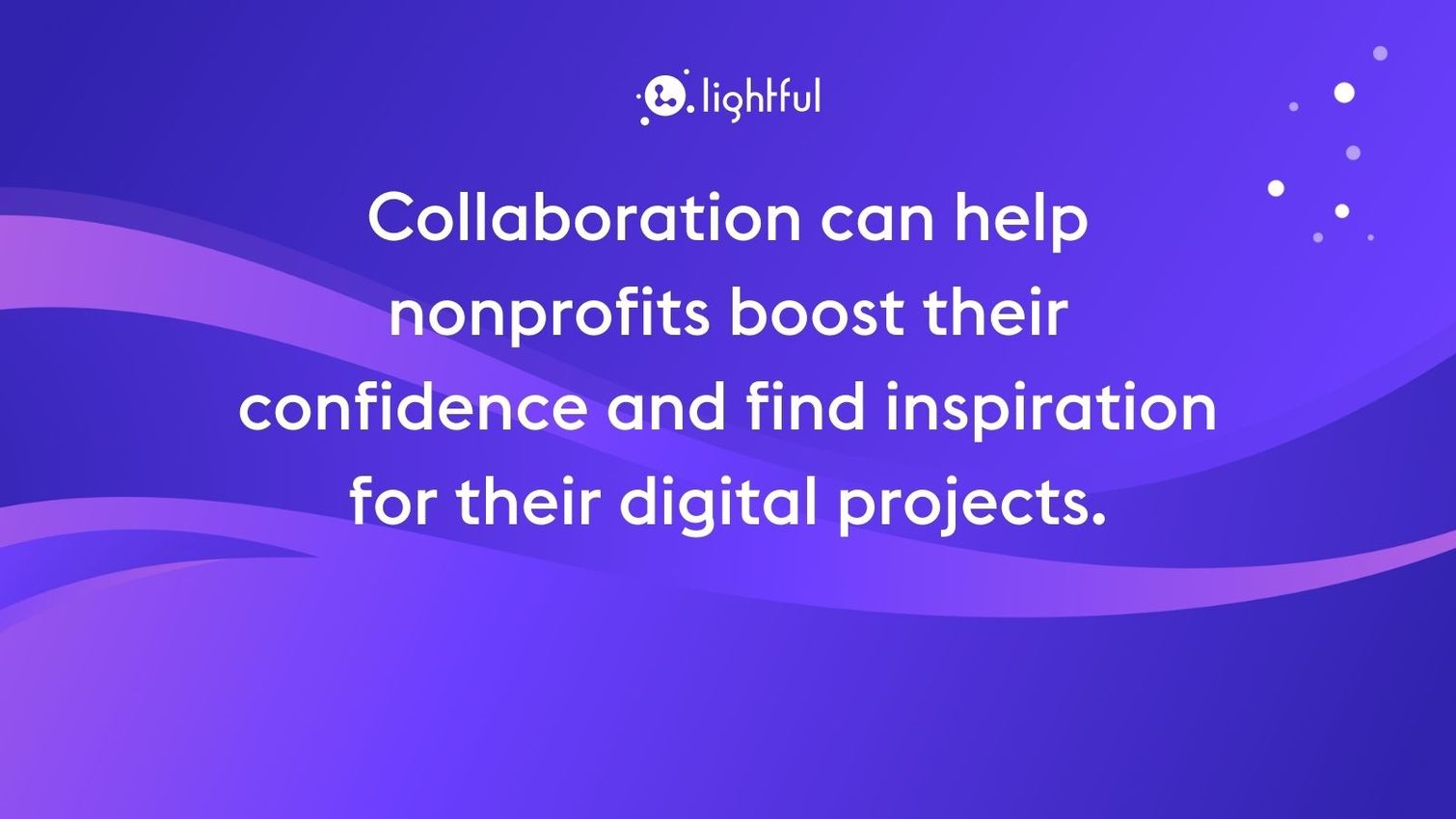
For charitable organisations, here’s how to support improvements to digital across the sector:
- Showcase what good looks like: It’s useful for many nonprofits who are just beginning their digital journeys to know what ‘good’ looks like and to learn from both successful and less successful case studies. As an intermediary, you can lead the sharing of the best approaches for projects and the common pitfalls to avoid.
- Encourage shared learning opportunities and collaboration: Collaboration has never been more needed, especially at a time where communication and events are in a hybrid format. As an intermediary in the charity sector, look for opportunities to bring nonprofits together to learn from each other, as well as opportunities that funders can collaborate to support shared grantees.
- Facilitate digital mentorship: If there are individuals who are more confident in their digital skills, introduce structures where these skills can be shared with nonprofits who are still new to digital. Any support is vital, even for the more basic skills.
- Reinforce what’s possible with technology: Many organisations would benefit from discovering what they can achieve with technology. It starts by helping them build confidence to find the right solution and technologies that meet their needs, both in the short-term and long-term.
Takeaways
COVID-19 has accelerated digital transformation for many nonprofits. Despite all the challenges, many have embarked on a digital journey that will help them continue delivering impact online more efficiently.
As we’ve discovered in this project, every organisation is at a different stage in their digital journey. Despite this, every organisation can benefit from an assessment of their needs and digital skills to create an iterative roadmap that improves their technology and processes.
For nonprofits: This is the perfect opportunity to learn from others and improve systems that will make the digital transition more efficient.
For funders: It’s crucial to learn more about grantees’ challenges and how to support them with building their digital skills to deliver long term organisational resilience and sustainability.
Latest articles
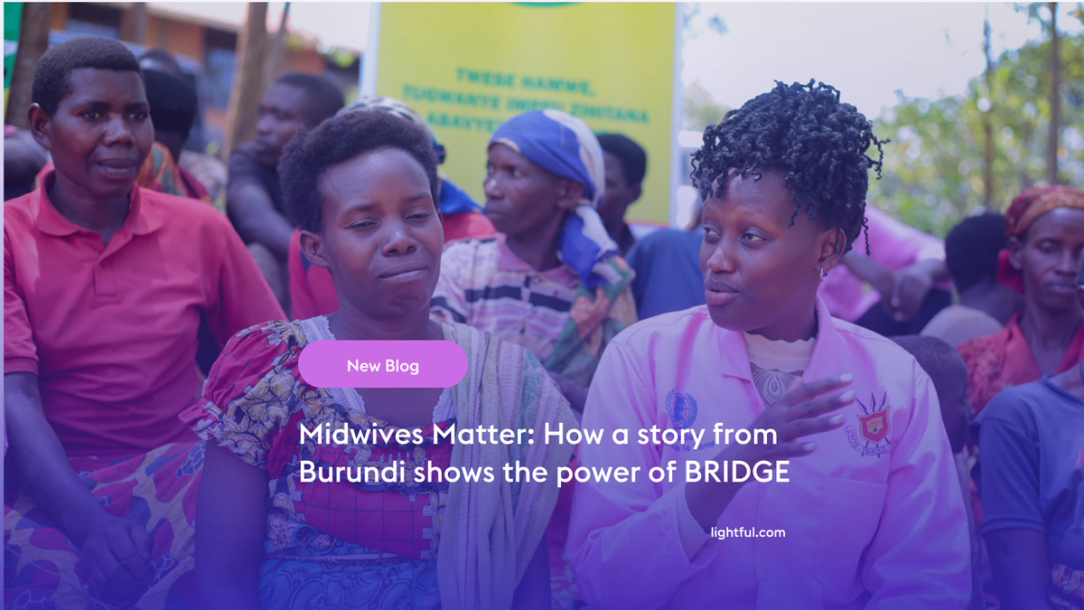
Over the past year, Lightful and the International Confederation of Midwives (ICM) have supported Midwives Associations across Africa, South Asia and the Eastern Mediterranean to build their digital confidence through our BRIDGE programme. These organisations were starting from very different places, but all shared the same goal: to use digital tools to strengthen their voice, raise their visibility and advocate for better outcomes for women and babies.
Related posts
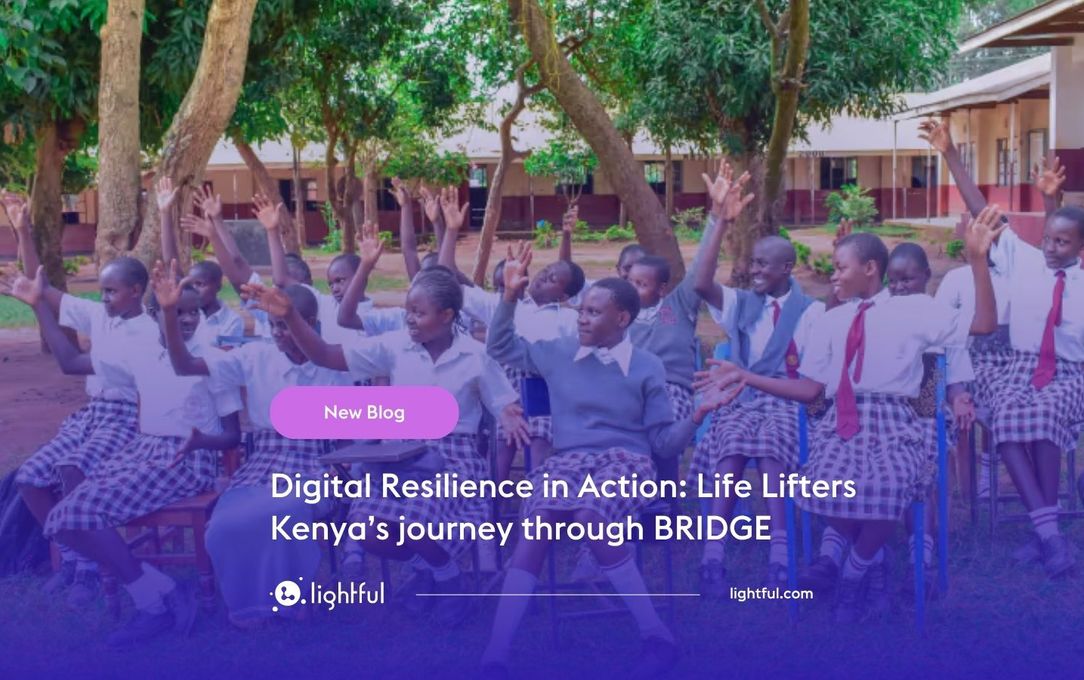
In today’s rapidly evolving digital landscape, the ability to engage online is a necessity. For nonprofits, especially those working in underserved regions or tackling complex social issues, digital tools can be the bridge between intention and impact. Whether it’s reaching new donors, advocating for policy change, or delivering services, digital capacity enables organisations to scale their mission and deepen their impact. Yet many grassroots organisations remain digitally under-resourced. That’s why Lightful created the BRIDGE programme - Building Resilience in Digital Growth and Engagement - to empower nonprofits with the skills, confidence, and strategies to thrive in the digital age and build lasting change.
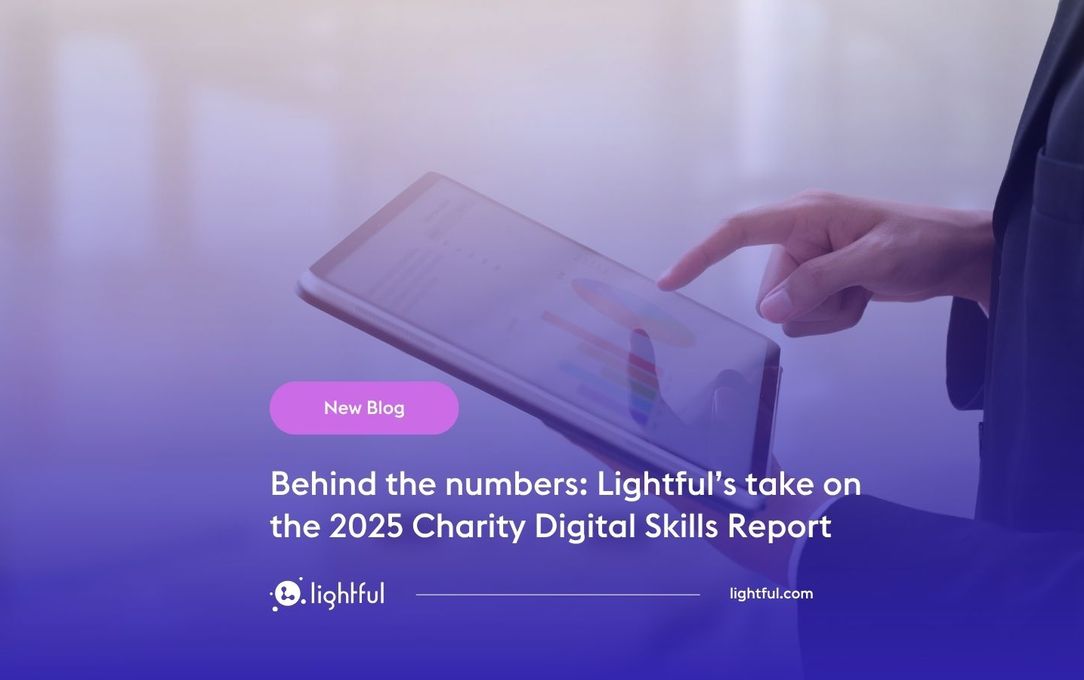
Advancing digital maturity: what Lightful has learned from supporting 3,500 charities globally
See who we help
Contact us
Want to learn more?
Email Jonathan and start a conversation






